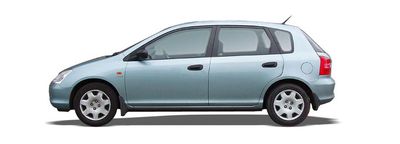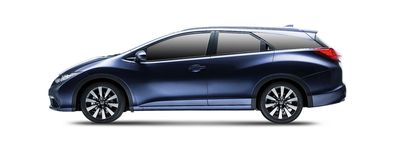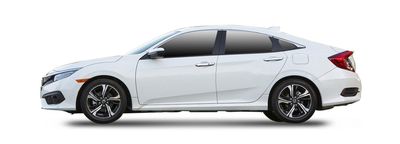Honda Civic engines
Since its introduction in 1972, the Honda Civic has become one of the most successful compact cars in the world, offering an impressive range of Honda Civic engines across eleven generations. Each generation has brought innovative technologies and different strengths, with Honda always focusing on reliability and efficiency. The technological evolution ranges from simple naturally aspirated engines to state-of-the-art turbocharged and hybrid powertrains.

Honda Civic engines: Historic generations I-V (1972-1995)

The first five Honda Civic generations established the brand's reputation for exceptional reliability and durability. These Honda Civic engines regularly reached 400,000 to 500,000 kilometers with proper maintenance, with the legendary CVCC engines of the 1970s already achieving low emissions without a catalytic converter. Major repairs were only required after 200,000 to 300,000 kilometers, mainly valve adjustments and clutch changes. The absolute top engine of this era was the 1.6-litre VTEC B16A from the fifth generation (1991-1995) with 160 hp - a technical masterpiece that revolutionized Honda's variable valve timing. These historic Honda Civic engines were all air-cooled or simply water-cooled and were characterized by their robustness and ease of maintenance.
Honda Civic gasoline engines: Historic generations I-V (1972-1995)
The Honda Civic gasoline engine range of this era mainly comprised naturally aspirated engines with displacements from 1.2 to 1.6 liters. The first generation (1972-1979) started with the revolutionary 1.2-liter CVCC engine with 50 hp, which already met strict emission regulations. The second generation (1979-1983) brought the 1.3-liter CVCC with 60 hp and improved fuel efficiency. In the third generation (1983-1987), the first 1.5-liter engines with up to 90 hp were added. The fourth generation (1987-1991) introduced the 1.6-liter D16A with 110 hp. The highlight was the fifth generation (1991-1995) with the groundbreaking 1.6-liter VTEC B16A (160 hp), which used Honda's variable valve timing for the first time and enabled sporty driving performance at high revs. These Honda Civic engines were considered virtually indestructible and only required regular oil changes and valve adjustments.
Honda Civic diesel engines: Historic generations I-V (1972-1995)
Diesel engines played a subordinate role in the early Honda Civic generations. Only in the third generation (1983-1987) was a 1.5-liter diesel with 58 hp offered in Europe, but it was not very popular due to its loudness and low performance. These Honda Civic diesel variants were mainly designed for extremely economical drivers, but still achieved the typical Honda reliability.
| Honda Civic engine |
Power output |
Fuel consumption |
Typical weaknesses |
Rating |
| 1.2 CVCC |
50 HP |
6.5 l/100km |
Very rare today |
Very good |
| 1.3 CVCC |
60 HP |
6.0 l/100km |
Valve adjustment every 20,000 km |
Very good |
| 1.5 naturally aspirated engine |
70-90 HP |
6.8 l/100km |
Robust construction |
Very good |
| 1.6 D16A |
110 HP |
7.2 l/100km |
Occasional water pump |
Very good |
| 1.6 VTEC B16A |
160 HP |
8.0 l/100km |
High revs required |
Very good |
| 1.5 Diesel |
58 HP |
4.8 l/100km |
Loud, little power |
Average |

Honda Civic engines: Generation VI (1995-2000)

The sixth generation Honda Civic marked the transition to more modern technologies while retaining legendary Honda reliability. These Honda Civic engines typically reached 350,000 to 450,000 kilometers, with major repairs usually only required after 250,000 kilometers. VTEC technology was refined and extended to more engine variants. The absolute highlight was the 1.6-litre VTEC B16A2 with 160 hp, which further optimized its predecessor and made it even more reliable. This generation also introduced the first modern safety systems and offered a balanced mix of performance, efficiency and durability.
Honda Civic gasoline engines: Generation VI (1995-2000)
The Honda Civic gasoline engine range included engines from 1.4 to 1.8 liters. The entry-level engine was a 1.4-liter D14A with 90 hp, followed by the 1.5-liter D15B with 114 hp. For sporty drivers, there was the 1.6-liter VTEC B16A2 with 160 hp and the new 1.8-liter B18C with 178 hp in the Type R. These Honda Civic engines were characterized by their high-revving characteristics and offered a perfect balance between everyday usability and sporting ambitions. The 1.5-liter D15B developed into the most reliable engine of this generation - it was economical, durable and required minimal maintenance.
Honda Civic diesel engines: Generation VI (1995-2000)
A 1.7-liter diesel with 68 hp was offered in Europe, which was significantly more refined than its predecessor. This Honda Civic Diesel offered a fuel consumption of only 4.2 liters per 100 km, but remained a niche solution due to its low performance.
| Honda Civic engine |
Power output |
Fuel consumption |
Typical weaknesses |
Rating |
| 1.4 D14A |
90 HP |
6.8 l/100km |
Occasional ignition coils |
Good |
| 1.5 D15B |
114 HP |
6.5 l/100km |
Extremely reliable |
Very good |
| 1.6 VTEC B16A2 |
160 HP |
7.8 l/100km |
High revs required |
Very good |
| 1.8 B18C |
178 HP |
8.5 l/100km |
Sports engine, high-maintenance |
Good |
| 1.7 diesel |
68 HP |
4.2 l/100km |
Little power |
Average |

Honda Civic engines: Generation VII (2000-2005)

The seventh generation Honda Civic brought with it a complete redesign and introduced i-VTEC technology for the first time. These Honda Civic engines continued to achieve an impressive 300,000 to 400,000 kilometers, with the new i-VTEC technology improving both performance and efficiency. Major repairs were typically only required after 200,000 to 250,000 kilometers, mainly water pumps and timing belts. The absolute top engine was the 2.0-liter i-VTEC K20A with 200 hp in the Type R, which introduced Honda's new K-series engine family. This generation was also the first with a modern common-rail diesel and marked Honda's entry into the European diesel offensive.
Honda Civic petrol engines: Generation VII (2000-2005)
The Honda Civic petrol engine range was completely revised and included the new K-series and further developed D-series engines. The 1.4-liter D14Z with 90 hp formed the basis, followed by the 1.6-liter D16V with 110 hp. The revolution came with the 1.7-liter i-VTEC D17A (115 hp) and the 2.0-liter i-VTEC K20A3 (160 hp). The highlight was the 2.0-liter K20A in the Type R with 200 hp. These Honda Civic engines combined variable valve timing with variable valve lift adjustment for the first time, offering optimum performance at both low and high engine speeds. The 1.7-liter i-VTEC proved to be the most balanced engine of this generation.
Honda Civic diesel engines: Generation VII (2000-2005)
Honda introduced the modern 1.7-liter CTDi diesel with 100 hp, which was equipped with common-rail technology and turbocharging. This Honda Civic diesel offered a fuel consumption of only 4.8 liters per 100 km and was significantly more refined than earlier diesel variants, but did not achieve the reliability of the gasoline engines.
| Honda Civic engine |
Power output |
Fuel consumption |
Typical weaknesses |
Rating |
| 1.4 D14Z |
90 HP |
6.2 l/100km |
Timing belt every 100,000 km |
Good |
| 1.6 D16V |
110 HP |
6.8 l/100km |
Proven technology |
Very good |
| 1.7 i-VTEC D17A |
115 HP |
6.0 l/100km |
Balanced and economical |
Very good |
| 2.0 i-VTEC K20A3 |
160 HP |
7.5 l/100km |
High-quality K-series |
Very good |
| 2.0 i-VTEC K20A |
200 HP |
8.8 l/100km |
Sports engine, regular maintenance |
Good |
| 1.7 CTDi |
100 HP |
4.8 l/100km |
Turbocharger, injection pump |
Average |

Honda Civic engines: Generation VIII (2005-2011)

The eighth generation Honda Civic was one of the most controversial due to its futuristic design, but continued to offer reliable engines. These Honda Civic engines typically reached 280,000 to 380,000 kilometers, with the i-VTEC technology being further refined. Major repairs were usually due after 180,000 to 220,000 kilometers, mainly water pumps and occasionally timing belts. The absolute highlight was the 2.0-liter i-VTEC K20Z4 with 201 hp in the Type R, which was considered one of the best atmospheric engines of its time. This generation also introduced Honda's first hybrid drive in Europe and showed the future direction of the brand.
Honda Civic gasoline engines: Generation VIII (2005-2011)
The Honda Civic petrol engine range focused on the proven i-VTEC technology with engines from 1.4 to 2.0 liters. The 1.4-liter i-VTEC with 100 hp formed the basis and proved to be particularly economical. The 1.8-liter i-VTEC R18A with 140 hp became the high-volume engine and offered a good balance between performance and fuel consumption. For sporty drivers, there was the 2.0-liter i-VTEC K20Z4 with 201 hp in the Type R. These Honda Civic engines were characterized by their smooth running and reliability, whereby the 1.8-litre i-VTEC was considered the best all-round engine of this generation - it was economical, durable and offered sufficient power for everyday use.
Honda Civic diesel engines: Generation VIII (2005-2011)
Honda opted for the further developed 2.2-liter i-CTDi diesel with 140 hp, which offered significantly more power than its predecessor. This Honda Civic diesel achieved a fuel consumption of 5.2 liters per 100 km and was equipped with a particulate filter, but occasionally suffered from problems with the high-pressure pump.
Honda Civic hybrid drive: Generation VIII (2005-2011)
For the first time, a Honda Civic Hybrid with a 1.3-liter IMA (Integrated Motor Assist) system was offered, which delivered 95 hp system power. Fuel consumption was only 4.4 liters per 100 km, but the complexity of the system led to higher maintenance costs.
| Honda Civic engine |
Power output |
Fuel consumption |
Typical weaknesses |
Rating |
| 1.4 i-VTEC |
100 HP |
5.8 l/100km |
Very economical and reliable |
Very good |
| 1.8 i-VTEC R18A |
140 HP |
6.2 l/100km |
Best all-round engine |
Very good |
| 2.0 i-VTEC K20Z4 |
201 HP |
8.0 l/100km |
Atmospheric sports engine |
Very good |
| 2.2 i-CTDi |
140 HP |
5.2 l/100km |
High-pressure pump, particulate filter |
Average |
| 1.3 IMA Hybrid |
95 HP |
4.4 l/100km |
Complex technology, battery problems |
Moderate |

Honda Civic engines: Generation IX (2011-2017)

The ninth Honda Civic generation brought with it a complete realignment and introduced turbocharging to the range for the first time. These Honda Civic engines continued to reach a respectable 250,000 to 350,000 kilometers, though the new turbocharged engines were slightly more maintenance-intensive than their predecessors. Major repairs were typically required after 150,000 to 200,000 kilometers, mainly turbochargers and water pumps. The absolute top engine was the 2.0-liter VTEC Turbo K20C1 with 310 hp in the Type R, which was considered one of the best turbocharged engines in its class. This generation also marked the end of atmospheric high-revving engines and the beginning of the turbo era at Honda.
Honda Civic gasoline engines: Generation IX (2011-2017)
The Honda Civic petrol engine range was revolutionized to include both atmospheric and turbocharged engines. The 1.4-liter i-VTEC with 100 hp and the 1.8-liter i-VTEC with 142 hp continued the proven tradition. New additions were the 1.5-liter VTEC Turbo with 182 hp and the 2.0-liter VTEC Turbo K20C1 with 310 hp in the Type R. These Honda Civic engines combined turbocharging with VTEC technology for the first time, offering high torque even at low engine speeds. The 1.5-liter VTEC Turbo proved to be the most balanced engine of this generation, while the 2.0-liter Turbo in the Type R set new standards for performance and driving dynamics.
Honda Civic diesel engines: Generation IX (2011-2017)
Honda introduced the new 1.6-liter i-DTEC diesel with 120 hp, which was significantly more efficient and refined than its predecessor. This Honda Civic Diesel offered a fuel consumption of only 3.8 liters per 100 km and was equipped with the latest common rail technology, but occasionally showed problems with the particulate filter on short journeys.
| Honda Civic engine |
Power output |
Fuel consumption |
Typical weaknesses |
Rating |
| 1.4 i-VTEC |
100 HP |
5.9 l/100km |
Proven technology |
Very good |
| 1.8 i-VTEC |
142 HP |
6.4 l/100km |
Reliable all-rounder |
Very good |
| 1.5 VTEC Turbo |
182 HP |
6.0 l/100km |
Balanced turbo engine |
Very good |
| 2.0 VTEC Turbo K20C1 |
310 HP |
8.8 l/100km |
Sports engine, high maintenance costs |
Good |
| 1.6 i-DTEC |
120 HP |
3.8 l/100km |
Particle filter for short journeys |
Average |

Honda Civic engines: Generation X (2017-2021)

The tenth Honda Civic generation perfected turbo technology and offered one of the brand's most sophisticated engine ranges. These Honda Civic engines typically reached 280,000 to 400,000 kilometers, with the turbo engines being significantly more reliable than in the previous generation. Major repairs were usually only required after 200,000 to 250,000 kilometers, mainly water pumps and occasionally turbochargers. The absolute highlight was the revised 2.0-liter VTEC Turbo K20C1 with 320 hp in the Type R, which offered even more power and better reliability. This generation also introduced a CVT automatic transmission for the first time at Honda and demonstrated the maturity of turbo technology.
Honda Civic gasoline engines: Generation X (2017-2021)
The Honda Civic petrol engine range focused entirely on turbo engines with the 1.0-liter VTEC Turbo (129 hp), the 1.5-liter VTEC Turbo (182 hp) and the 2.0-liter VTEC Turbo (320 hp). The new 1.0-liter three-cylinder turbo was a surprise and offered impressive performance despite its small size. These Honda Civic engines were characterized by their efficiency and high torque even at low revs. The 1.5-liter VTEC turbo became the best engine of this generation - it was economical, powerful and reliable, with a fuel consumption of only 5.7 liters per 100 km.
Honda Civic diesel engines: Generation X (2017-2021)
The proven 1.6-liter i-DTEC diesel was further developed and now offered 120 hp with even better efficiency. This Honda Civic Diesel achieved a fuel consumption of only 3.7 liters per 100 km, but remained a niche solution due to increasing electrification.
| Honda Civic engine |
Power output |
Fuel consumption |
Typical weaknesses |
Rating |
| 1.0 VTEC Turbo |
129 HP |
5.2 l/100km |
Three-cylinder smoothness |
Good |
| 1.5 VTEC Turbo |
182 HP |
5.7 l/100km |
Best all-round engine |
Very good |
| 2.0 VTEC Turbo K20C1 |
320 HP |
8.5 l/100km |
Sports engine, more reliable than predecessor |
Very good |
| 1.6 i-DTEC |
120 HP |
3.7 l/100km |
Particle filter, not widely used |
Average |

Honda Civic engines: Generation XI (2021-today)
The current Honda Civic generation relies entirely on electrification and represents Honda's vision of the future with exclusively electrified powertrains. All petrol engines are now equipped with e:HEV hybrid technology, which offers impressive efficiency. As the generation has only been on the market since 2021, long-term experience is not yet available, but the first tests show promising approaches. The top-of-the-range engine is the 2.0-liter e:HEV hybrid with 184 hp system output, which combines sporty driving performance with exceptional efficiency. The new e:HEV technology promises a service life of over 350,000 kilometers, as the combustion engine is optimally supported.
Honda Civic Hybrid Drive: Generation XI (2021-today)
The Honda Civic engine range consists exclusively of e:HEV hybrid drives with two variants: the 1.5-liter e:HEV with 131 hp and the 2.0-liter e:HEV with 184 hp system output. These Honda Civic engines use Honda's innovative e:HEV technology, in which the electric motor is primarily responsible for propulsion and the gasoline engine functions mainly as a generator. The 2.0-liter e:HEV is considered particularly successful and is shaping up to be the best engine of this generation - it offers seamless power delivery and has so far been free of major production issues.
Honda Civic petrol engines: Generation XI (2021-today)
Classic petrol engines without electrification no longer exist. All Honda Civic engines are now full hybrids with e:HEV technology, offering a completely new driving experience. The 1.5-liter e:HEV combines an Atkinson cycle gasoline engine with two electric motors and achieves a fuel consumption of only 4.2 liters per 100 km.
| Honda Civic engine |
Power output |
Fuel consumption |
Typical weaknesses |
Rating |
| 1.5 e:HEV |
131 HP |
4.2 l/100km |
New technology, no long-term experience yet |
Very good |
| 2.0 e:HEV |
184 HP |
4.5 l/100km |
Innovative e:HEV technology |
Very good |

Conclusion: The best Honda Civic engines of all generations
The development of Honda Civic engines shows an impressive continuity in terms of reliability and innovation. While the early atmospheric engines impressed with their longevity, the modern turbo and hybrid drives have set new standards for efficiency and performance. Honda Civic engines have traditionally stood for reliability, low maintenance costs and high mileage - characteristics that are continued in the current generation with e:HEV technology.
- Best Honda Civic gasoline engine:
The 1.5-liter VTEC Turbo (Generation X) combines advanced turbo technology with proven Honda reliability, offering an excellent balance of performance, efficiency and durability.
- Best Honda Civic diesel engine:
The 1.6-liter i-DTEC (Generation IX & X) offers the best combination of efficiency and everyday usability, although diesel engines never reached the prominence of gasoline engines at Honda.
- Best Honda Civic hybrid engine:
The 2.0-liter e:HEV (Generation XI) with its innovative full hybrid technology, ushering in a new era of efficiency and driving dynamics.
For maintenance and spare parts for all Honda Civic generations, AUTODOC offers a comprehensive range of original and quality spare parts with fast delivery and expert advice.























